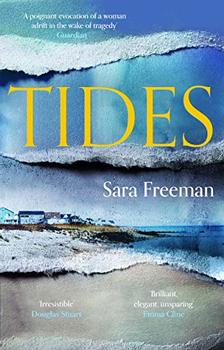Summary | Excerpt | Reviews | Beyond the book | Read-Alikes | Genres & Themes | Author Bio

Tides, Sara Freeman's debut novel, begins by orienting the reader in ongoing action. Mara, our protagonist, has left everything and everybody she knows and loves and is on a bus going somewhere known only as "[t]he sea." We realize that she has undergone a devastating loss, and we're even told what that loss is. But we might wonder if that alone is the trigger for her leaving her life behind.
Freeman doesn't meditate over grief and bereavement by delivering heavy, prosaic or descriptive reflections. Instead, there is action. Mara arrives at a wealthy seaside town with a few dollars in her pocket, very few clothes, a dead phone and no real plan. We are taken on her journey as she figures out what to do with herself.
The novel unravels as Mara's psyche also unravels before us, bit by bit, evenly at first, and then with gentle momentum, much like a surprise wave tiding over the beach, higher than we expected it to be. The book is a lyrically charged, stirring exploration of selfhood and what it means to try to escape from it. In one scene, Mara thinks about how some of the townspeople have had "their lives so reconfigured, they bear little resemblance to the originals." But her own life is "a renovation so total, there is nothing left over to compare it to."
It's not what she has done, or keeps doing, but the knowledge of who she fundamentally is that makes her want to destroy herself, "to dispossess herself." Mistakes can be rectified, actions condoned, condemned, and in time, forgotten. But how do you improve upon the raw material you're made up of? So, newly arrived in an unknown town, Mara goes swimming in the sea. She eats peanut butter with a spoon for dinner, spends the day hiding in a laundromat and sneaks up to sleep in her new boss's attic room above his shop. She wants "to slip into a blind spot, to run out on her life."
Mara's complexity is shown through how she is juxtaposed against the men in her life. She feels helpless about the intense, possessive love she harbors for her brother Paul, along with a latent hope that he will come and rescue her. Lucien, her husband, is a marker of everything she thinks is wrong with her. Firmly lodged in her mind, he keeps cropping up even as she is trying to escape him and herself, inevitably contributing to the formation of her "new" self. And Simon, the wine shop owner who she starts working with and eventually develops feelings for, becomes a means for her to redeem herself for herself, but even that happens almost passively, reluctantly.
There is a fine line between sentimentalism and lyricism. Freeman seems to totter over this line, so that sometimes, her prose comes off as sentimental and affectedly poetic. Fortunately, it never totally veers off into that realm. Mara is a complicated character, but it is Freeman's craft that enables us to feel moved by her, rather than experience pity or frustration. Tides wrestles with the idea of a body that will want, of a self that will be undone by its need to love and be loved, to belong, to find a clear path for itself. All in all, it seems to be asking, can you ever truly escape yourself?
![]() This review was originally published in The BookBrowse Review in February 2022, and has been updated for the
February 2023 edition.
Click here to go to this issue.
This review was originally published in The BookBrowse Review in February 2022, and has been updated for the
February 2023 edition.
Click here to go to this issue.

If you liked Tides, try these:

by Rachel Cusk
Published 2022
From the author of the Outline trilogy, a fable of human destiny and decline, enacted in a closed system of intimate, fractured relationships.

by Jhumpa Lahiri
Published 2022
A marvelous new novel from the Pulitzer Prize winning author of The Lowland and Interpreter of Maladies--her first in nearly a decade.
Your guide toexceptional books
BookBrowse seeks out and recommends the best in contemporary fiction and nonfiction—books that not only engage and entertain but also deepen our understanding of ourselves and the world around us.